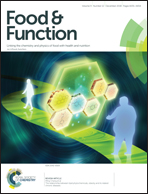Troxerutin down-regulates KIM-1, modulates p38 MAPK signaling, and enhances renal regenerative capacity in a rat model of gentamycin-induced acute kidney injury†
Abstract
Gentamycin is an aminoglycoside antibiotic that is widely employed for controlling Gram negative bacterial infections including that caused by the antibiotic-resistant Pseudomonas species. The clinical use of gentamycin is substantially limited by its side effects particularly acute kidney injury (AKI). The aim of the current study was to investigate the protective effect of the plant flavonoid troxerutin (150 mg kg−1 day−1 for 15 days) against gentamycin-induced AKI using Wistar rats as an experimental mammalian model. The results of the present work revealed that troxerutin significantly improved renal function as demonstrated by the increase in the glomerular filtration rate and the decrease in the levels of urinary albumin, urinary albumin to creatinine ratio, serum creatinine, and blood urea nitrogen (p < 0.001). In addition, troxerutin significantly attenuated gentamycin-induced renal tissue injury as indicated by the decreased protein expression of the renal tubular injury marker KIM-1, the attenuation of the renal histopathological changes, and the modulation of the oxidative stress markers as reflected by the decrease in the levels of lipid and protein oxidative modifications and the increase in the levels of reduced glutathione and total antioxidant capacity (p < 0.001). Furthermore, troxerutin down-regulated the levels of inflammatory cytokines (IL-10, TNF-α, and IL-6), attenuated apoptotic cell death, and enhanced the renal tissue regenerative capacity as demonstrated by the increase in the protein expression of the proliferating cell nuclear antigen, PCNA (p < 0.001). Collectively, the results of the current study highlight, for the first time, the ameliorating effects of troxerutin against gentamycin-induced AKI in rats that is potentially mediated via the modulation of p38 MAPK signaling as well as via antioxidant, anti-inflammatory and anti-apoptotic activities.



 Please wait while we load your content...
Please wait while we load your content...